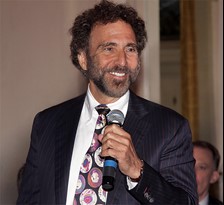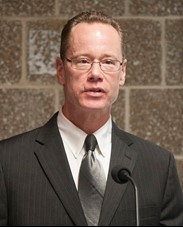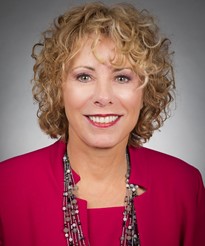The Brightest Lights
Mendoza’s Department of Marketing hosts the prestigious AMA Sheth Doctoral Consortium 2016 — bringing together top researchers in the discipline’s many and varied areas of study
David Reibstein had an appointment to keep.
Just after the American Marketing Association-Sheth Doctoral Consortium ended at the Mendoza College of Business, Reibstein, a featured speaker at the event, caught a flight for Israel where he was scheduled to have dinner with Prime Minister Benjamin Natanyahu and members of the Knesset.
On the face of it, connecting the dots between a marketing conference and a dinner with a head of state takes a stretch of the imagination. But in reality, for Reibstein, it’s a very straight line. Both events are part of marketing.
“I ended up giving a major presentation at a mini version of the economic forum on the topic of ‘Brand Israel,’” said Reibstein, the William Stewart Woodside Professor of Marketing at The Wharton School, who is a preeminent scholar in the area of branding countries. “Israel should be concerned about its brand; it’s connected with significant economic consequences.”
Reibstein is just one example of the rich and varied experts present at the 2016 AMA-Sheth Consortium, held June 8 - June 11. The event is considered the premiere consortium for those in the marketing discipline. Invitees comprise two groups — faculty scholars who have made important contributions to the field and the top doctoral students from business schools across the globe.
The aim of the event is twofold: for faculty to share their latest research interests with their colleagues and students, and to challenge the students especially to expand their view about what makes good research. The consortium also functions as a high-level job fair of sorts as well, since the students are on the verge of finishing their dissertations and beginning to look for positions. The consortium provides them with the opportunity to get acquainted with the researchers; participate in multiple sessions that offer perspectives topics running the gamut from successful teaching to conducting research; and to hear about available openings.
Among the 100-plus faculty members were those who are truly pioneers, such as Philip Kotler, the S.C. Johnson & Son Professor of International Marketing at the Kellogg School of Management, who is so legendary for his expertise that his image actually appears on a postage stamp in Indonesia. He is the author of 57 books including Marketing Management: Analysis, Planning, Implementation and Control, the most widely used marketing book in graduate business schools worldwide.
Panelist Valarie Zeithaml, the David S. Van Pelt Family Distinguished Professor of Marketing at UNC Kenan-Flagler, was named a Thomson Reuters Highly Cited Researcher in the report, “The World’s Most Influential Scientific Minds,” for her work in influencing the future direction of marketing.
Ronald Hill, the Richard J. and Barbara Naclerio Endowed Chair in Business at Villanova School of Business, who also served as a panelist, represents a distinctly different perspective of marketing; his expertise is in marketing to the “bottom of the pyramid” — the very poor and even the imprisoned, which are segments of the population largely ignored by mainstream marketing.
The list of illustrious scholars includes Mendoza marketing professors William Wilkie and Elizabeth Moore, who co-chaired the consortium. Moore, who has conducted groundbreaking research in the area of food advertising and its impact on childhood obesity.
Wilkie, the Aloysius and Eleanor Nathe Professor of Marketing Strategy, has received numerous academic recognitions, including the AMA’s highest honor, the Distinguished Marketing Educator Award, as well as the AMA’s Lifetime Achievement Award for research on marketing’s impacts on society. In 2012, the AMA Foundation honored Wilkie’s contributions by inaugurating the William L. Wilkie Marketing for a Better World Award, that is presented annually to a leading marketing thinker whose work has advanced this cause.
During the consortium’s 50-year history, hosts have included top universities from across the globe, such as Harvard, London Business School, Wharton and Northwestern. Notre Dame last hosted the event in 1986.
Being selected to host the event involves a highly competitive process. Wilkie and Moore submitted the proposal to the AMA two years ago, suggesting the theme of “The Fascinating Field of Marketing.”
“Part of our goal was to combat this issue of fragmentation in the field,” said Wilkie. He’s referring to an issue arising in the discipline over the last three decades as marketing has borrowed theories from other disciplines, such as psychology, sociology and statistics. In turn, the number of research specialties has proliferated. The result, according to Wilkie and Moore, is fragmentation of research, with scholars narrowing their focus and diluting the overall coherence of the body of marketing research.
“What this means at the doctoral student level is that some of those attending will know a considerable amount about, say, the quantitative side, and very little about the behavioral or managerial part of the field,” said Wilkie. “We wanted them to hear from the leading thinkers in the field about its true nature — that marketing is actually a huge, sprawling, and really interesting and important field of study.”
The discipline represents the linkage of a firm to its markets, and in the aggregate, is the area that “provisions society,” providing products and services to the world at large, Wilkie continued.
“This means that marketing academics need to understand not only the decisions that firms are making, about selling their goods or services, but also the decisions of millions of customers, both consumers and organizations who are buying those goods or services,” he said. “Not surprisingly, very different theories are studied, and methods range from highly quantitative to quite qualitative in nature. As research specialization has advanced, we’ve begun to see fragmentation growing within the field — silos forming within Ph.D. education.”
Set against this analysis, the consortium acts as something akin to the United Nations — a platform for sharing challenges, learning and issues in a context that promotes the body of marketing research as a whole.
“There are a number of specialized conferences in our field, where sub-groups of researchers focus on their own more circumscribed areas of interest,” said Moore. “The AMA-Sheth Foundation Consortium allows leading marketing scholars to address big, important issues in our world through multiple theoretical vantage points and using different research methods. This is quite instructive because viewing a topic from a single perspective can be limiting — certain features will be highlighted and others hidden.
“In our own writing, we have suggested that in order to comprehend a complex topic well, it is helpful to walk around it mentally, adopting multiple perspectives and searching for new insights,” continued Moore. “In bringing together distinguished faculty from across the marketing discipline, the consortium offers such an opportunity to explore the frontiers of marketing thought together, creating new levels of understanding on the cutting edge issues in our field.”
* * *
Why you buy Italian shoes

David Reibstein, William Stewart Woodside Professor of Business; The Wharton School at the University of Pennsylvania
David Reibstein makes the case for the importance of a country’s brand with a simple test.
“If you had to choose a pair of shoes — one pair is made in Italy, the other in Bulgaria. Same style, same quality, same leather. Which one would you choose?” Well, Italy.
Precisely, said Reibstein. The world over connotes Italian leather with top quality and luxury. Italy has branded itself successfully as a top maker of luxury goods and designer fashion, which in turn is a major economic driver.
The researcher can cover as many as five continents in a summer with his consulting work. He headed to Japan in November to talk about Brand Japan, then over to India to meet with National Institution for Transforming India (NITI), a government think tank devoted to supporting innovation and entrepreneurship.
During the AMA-Sheth Consortium, however, he presented on a more elemental topic: What is marketing?
“Most people don’t have a good instinct about what marketing is, and think, ‘Oh, advertising,’” he said. “Companies, too. But it’s much broader than that.”
Marketing plays a big role in being the interface between the company and customers, said Reibstein, which means thinking beyond a product to understanding the markets, and then utilizing that information in a strategic way to guide company operations. But the real transition for companies and those going into marketing, he said, is the impact of data technology.
“Where marketing is going is basically from an era of observation and surveys to one of being handlers of tremendous amounts of customer information in the form of data,” Reibstein said. “This has significant implications going forward for people electing to go into marketing. Historically, it turns out that people who go into marketing are people who can grasp concepts. But now, they will need to be able to make sense out of data. Marketing will not be a hiding place for people who want to avoiding analytics.”
The Contrarian

Ronald Hill, Richard J. and Barbara Naclerio Endowed Chair in Business; Villanova School of Business
Ronald Hill’s expertise is described as “base-of-the-pyramid consumers.”
This means the very poor, even the imprisoned — very far from the usual target audiences typically associated with marketing, which is precisely Hill’s point.
“The theory we have about people as consumers only really applies to about 15 percent of the population,” said Hill. “Half of the world’s people lives in abject poverty. If we are going to build theories about the way people behave, we need to do it more holistically.”
Hill’s perspective came about as part of a journey of his Catholic faith that began in the 1980s, where he found he could no longer talk about people as commodities, but instead began focusing on their humanity. He decided to write about the poor.
“There were very few researchers looking at that,” he said. “For a discipline focused on finding needs and filling them, we weren’t doing a good job. The homeless, for example. How in the heck do they get the basic set of commodities that people need to live day to day? I didn’t know how they did it. Nobody did.”
Through the years, Hill’s research methods have ranged from mopping floors in a mission, to working with the Aboriginal people in Australia, to assisting with a UN project on world hunger. He states his views very firmly, especially in regard to where he thinks marketing in general is missing the mark, and even more so where he feels led by Catholic Social Teaching.
“I just decided to make it my calling. I have been amazed at the resiliency of the people we look down at in our society,” he said. “Even people who have been incarcerated for 20 years and worked the lowest level jobs — somehow they find a way to have dignity in their world, to scrape together and even rise above the conditions they are in.
“It’s been a great career, but it’s a humbling experience. I say to people, the next time you walk by a homeless person, stop for a few minutes and say hello. Give them a few dollars. You will start to see not only how much we have, but what Christ has called us to do.”
Getting to know you

Valarie Zeithaml, David S. Van Pelt Family Distinguished Professor of Marketing; Kenan-Flagler Business School at the University of North Carolina
Valarie Zeithaml, who has devoted 35 years to researching, consulting and teaching marketing, has seen some dramatic shifts in the field. Where the focus used to be on quality or customer satisfaction with a product or service (Was he or she happy with the product? Did it meet expectations?), she now finds the relationship between companies, customers and society much more complex.
“Customers want to experience the organization with emotionally positive interactions, especially with employees,” said Zeithaml, who focuses on service quality and service marketing in her research. “They also want to figure out how to connect online, in stores and through all other approaches, aligning all of their touchpoints in an integral and sometimes exciting way.” Whereas companies historically have been very brand-focused, they now need to pivot to customer focus. “Customer experience includes every point of interaction from pre-purchase to post-purchase.”
She believes that there is a need for broadening the traditional perspectives of strategy and consumer behavior to take into account the more complex interactions occurring among individuals, society and organizations. Marketing has become highly fragmented, with many researchers focusing just on quantitative and incremental contributions. By understanding the larger context, marketers will be able to have more significant positive impacts on society, she said. “Companies will be able to help customers improve their behavior and outcomes when it comes to health care, or help people with low income find better ways to subsist.”

Comments